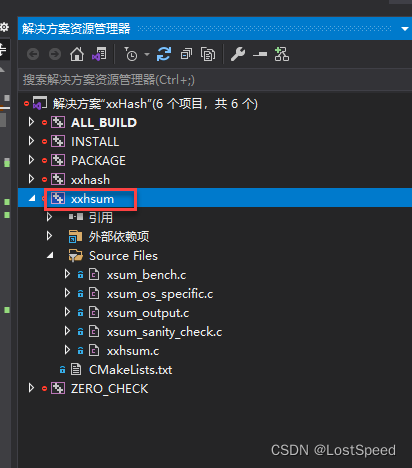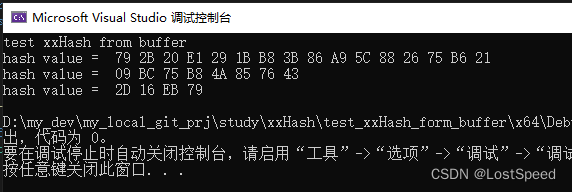xxHash - 编译, 库用法
文章目录
xxHash - 编译, 库用法
概述
给AES设置 key, iv时, 如果长度不够, 需要填充.
刚开始实现填充时, 用的固定内容, 感觉不太好.
看到github上有个xxHash工程, 很多星, 准备用这个工程来生成固定长度的hash来填充key, iv. 这样填充内容的随机性和确定性就好很多.
不管原始key, iv的长度多少, 都先用xxHash处理成符合AES要求的key, iv长度的buf, 再调用AES加解密函数, 这样就不用考虑key, iv的填充问题了.
笔记
xxHash的代码库地址
https://github.com/Cyan4973/xxHash.git
编译
迁出到本地
打开普通的cmd命令行
cd /d D:\3rd_prj\crypt\xxHash\cmake_unofficial
mkdir .\build
cd .\build
cmake -G "Visual Studio 16 2019" -A x64 ..
cmake --build .
cmake --build . --target install
库安装后的路径为 C:\Program Files\xxHash
目录内容如下:
C:\Program Files\xxHash>tree /F
文件夹 PATH 列表
卷序列号为 BA70-59B2
C:.
├─bin
│ xxhash.dll
│ xxhsum.exe
│
├─include
│ xxh3.h
│ xxhash.h
│
├─lib
│ │ xxhash.lib
│ │
│ ├─cmake
│ │ └─xxHash
│ │ xxHashConfig.cmake
│ │ xxHashConfigVersion.cmake
│ │ xxHashTargets-debug.cmake
│ │ xxHashTargets.cmake
│ │
│ └─pkgconfig
│ libxxhash.pc
│
└─share
└─man
└─man1
xxhsum.1
现在就可以拿 /lib/xxhash.lib, /include/*.h, /bin/xxhash.dll包含到自己工程干活了.
xxHash的用法
看 xxhsum.exe的实现.
在编译目录中, 有xxhsum的VS工程实现.

打开 xxHash.sln

将xxhsum设置活动工程.
找到程序入口
/*
* The preferred method of obtaining the real UTF-16 arguments. Always works
* on MSVC, sometimes works on MinGW-w64 depending on the compiler flags.
*/
#ifdef __cplusplus
extern "C"
#endif
int __cdecl wmain(int argc, wchar_t* utf16_argv[])
{
return XSUM_wmain(argc, utf16_argv);
}
#else /* !XSUM_WIN32_USE_WMAIN */
下断点, 单步单步xxhsum的实现, 大致看一下.
自己搭建一个测试工程
用安装后的xxHash库和xxhsum工程实现, 自己搭建一个独立测试工程.
整了一个命令行工程(cosole x64 debug), 将库拷贝到自己工程, 设置头文件包含路径和库路径
先加入xxhsum.c, 尝试编译, 确啥补啥.
官方cli工程里面包含xxhash.h时, 都是用…/xxhash.h, 改为xxhash.h
编译通过, 功能正常.
测试工程文件目录
D:\my_dev\my_local_git_prj\study\xxHash\my_xxhsum>tree /F
文件夹 PATH 列表
卷序列号为 36AD-51CE
D:.
│ my_xxhsum.sln
│ my_xxhsum.vcxproj
│ my_xxhsum.vcxproj.filters
│ my_xxhsum.vcxproj.user
│ xsum_arch.h
│ xsum_bench.c
│ xsum_bench.h
│ xsum_config.h
│ xsum_os_specific.c
│ xsum_os_specific.h
│ xsum_output.c
│ xsum_output.h
│ xsum_sanity_check.c
│ xsum_sanity_check.h
│ xxhsum.c
│
└─xxHash_lib
├─bin
│ xxhash.dll
│ xxhsum.exe
│
├─include
│ xxh3.h
│ xxhash.h
│
├─lib
│ │ xxhash.lib
│ │
│ ├─cmake
│ │ └─xxHash
│ │ xxHashConfig.cmake
│ │ xxHashConfigVersion.cmake
│ │ xxHashTargets-debug.cmake
│ │ xxHashTargets.cmake
│ │
│ └─pkgconfig
│ libxxhash.pc
│
└─share
└─man
└─man1
xxhsum.1
程序参数怎么给?
static int XSUM_usage(const char* exename)
{
XSUM_log( WELCOME_MESSAGE(exename) );
XSUM_log( "Print or verify checksums using fast non-cryptographic algorithm xxHash \n\n" );
XSUM_log( "Usage: %s [options] [files] \n\n", exename);
XSUM_log( "When no filename provided or when '-' is provided, uses stdin as input. \n");
XSUM_log( "\nOptions: \n");
XSUM_log( " -H# select an xxhash algorithm (default: %i) \n", (int)g_defaultAlgo);
XSUM_log( " 0: XXH32 \n");
XSUM_log( " 1: XXH64 \n");
XSUM_log( " 2: XXH128 (also called XXH3_128bits) \n");
XSUM_log( " 3: XXH3 (also called XXH3_64bits) \n");
XSUM_log( " -c, --check read xxHash checksum from [files] and check them \n");
XSUM_log( " -h, --help display a long help page about advanced options \n");
return 0;
}
static int XSUM_usage_advanced(const char* exename)
{
XSUM_usage(exename);
XSUM_log( "\nAdvanced :\n");
XSUM_log( " -V, --version Display version information \n");
XSUM_log( " --tag Produce BSD-style checksum lines \n");
XSUM_log( " --little-endian Checksum values use little endian convention (default: big endian) \n");
XSUM_log( " --binary Read in binary mode \n");
XSUM_log( " -b Run benchmark \n");
XSUM_log( " -b# Bench only algorithm variant # \n");
XSUM_log( " -i# Number of times to run the benchmark (default: %i) \n", NBLOOPS_DEFAULT);
XSUM_log( " -q, --quiet Don't display version header in benchmark mode \n");
XSUM_log( "\n");
XSUM_log( "The following five options are useful only when verifying checksums (-c): \n");
XSUM_log( " -q, --quiet Don't print OK for each successfully verified file \n");
XSUM_log( " --status Don't output anything, status code shows success \n");
XSUM_log( " --strict Exit non-zero for improperly formatted checksum lines \n");
XSUM_log( " --warn Warn about improperly formatted checksum lines \n");
XSUM_log( " --ignore-missing Don't fail or report status for missing files \n");
return 0;
}
给出不同命令行参数, 试试效果.
-H3
-H3 D:\my_tmp\my_xxhsum.pdb
结果如下:
\XXH3_82fc89454f8a2238 D:\\my_tmp\\my_xxhsum.pdb
-H3 --binary
-H3 --binary D:\my_tmp\my_xxhsum.pdb
结果如下:
\XXH3_82fc89454f8a2238 D:\\my_tmp\\my_xxhsum.pdb
看来都是2进制读取文件内容并计算hash.
单步时, 发现 --binary 是无效的, 被忽略掉了
if (!strcmp(argument, "--binary")) { continue; } /* Just ignore it. See https://github.com/Cyan4973/xxHash/issues/812 */
算hash的cli函数
return XSUM_hashFiles(argv+filenamesStart, argc-filenamesStart, algo, displayEndianess, convention);
看到使用xxHash库的最终用法了
/*
* XSUM_hashStream:
* Reads data from `inFile`, generating an incremental hash of type hashType,
* using `buffer` of size `blockSize` for temporary storage.
*/
static Multihash
XSUM_hashStream(FILE* inFile,
AlgoSelected hashType,
void* buffer, size_t blockSize)
{
XXH32_state_t state32;
XXH64_state_t state64;
XXH3_state_t state3;
/* Init */
(void)XXH32_reset(&state32, XXHSUM32_DEFAULT_SEED);
(void)XXH64_reset(&state64, XXHSUM64_DEFAULT_SEED);
(void)XXH3_128bits_reset(&state3);
/* Load file & update hash */
{ size_t readSize;
while ((readSize = fread(buffer, 1, blockSize, inFile)) > 0) {
switch(hashType)
{
case algo_xxh32:
(void)XXH32_update(&state32, buffer, readSize);
break;
case algo_xxh64:
(void)XXH64_update(&state64, buffer, readSize);
break;
case algo_xxh128:
(void)XXH3_128bits_update(&state3, buffer, readSize);
break;
case algo_xxh3:
(void)XXH3_64bits_update(&state3, buffer, readSize);
break;
default:
assert(0);
}
}
if (ferror(inFile)) {
XSUM_log("Error: a failure occurred reading the input file.\n");
exit(1);
} }
{ Multihash finalHash = {0};
switch(hashType)
{
case algo_xxh32:
finalHash.hash32 = XXH32_digest(&state32);
break;
case algo_xxh64:
finalHash.hash64 = XXH64_digest(&state64);
break;
case algo_xxh128:
finalHash.hash128 = XXH3_128bits_digest(&state3);
break;
case algo_xxh3:
finalHash.hash64 = XXH3_64bits_digest(&state3);
break;
default:
assert(0);
}
return finalHash;
}
}
保存Hash值
/* display Hash value in selected format */
switch(hashType)
{
case algo_xxh32:
{ XXH32_canonical_t hcbe32;
(void)XXH32_canonicalFromHash(&hcbe32, hashValue.hash32);
f_displayLine(fileName, &hcbe32, hashType);
break;
}
case algo_xxh64:
{ XXH64_canonical_t hcbe64;
(void)XXH64_canonicalFromHash(&hcbe64, hashValue.hash64);
f_displayLine(fileName, &hcbe64, hashType);
break;
}
case algo_xxh128:
{ XXH128_canonical_t hcbe128;
(void)XXH128_canonicalFromHash(&hcbe128, hashValue.hash128);
f_displayLine(fileName, &hcbe128, hashType);
break;
}
case algo_xxh3:
{ XXH64_canonical_t hcbe64;
(void)XXH64_canonicalFromHash(&hcbe64, hashValue.hash64);
f_displayLine(fileName, &hcbe64, hashType);
break;
}
default:
assert(0); /* not possible */
}
显示hash值
static void XSUM_printLine_GNU(const char* filename,
const void* canonicalHash, const AlgoSelected hashType)
{
XSUM_printLine_GNU_internal(filename, canonicalHash, hashType, XSUM_display_BigEndian);
}
static void XSUM_printLine_GNU_internal(const char* filename,
const void* canonicalHash, const AlgoSelected hashType,
XSUM_displayHash_f f_displayHash)
{
assert(0 <= hashType && (size_t)hashType <= XSUM_TABLE_ELT_SIZE(XSUM_algoName));
{ const size_t hashLength = XSUM_algoLength[hashType];
const int needsEscape = XSUM_filenameNeedsEscape(filename);
if (needsEscape) {
XSUM_output("%c", '\\');
}
XSUM_displayPrefix(hashType);
f_displayHash(canonicalHash, hashLength);
XSUM_output(" ");
XSUM_printFilename(filename, needsEscape);
XSUM_output("\n");
} }
static void XSUM_display_BigEndian(const void* ptr, size_t length)
{
const XSUM_U8* const p = (const XSUM_U8*)ptr;
size_t idx;
for (idx=0; idx<length; idx++)
XSUM_output("%02x", p[idx]);
}
懂了
自己写一个命令行工程, 对一个buffer来做hash
官方工程是针对文件做hash, 我要的是对buffer做hash.
通过单步, 这个库的用法已经清楚了. 自己来整一遍, 只不过, 我要的是对buffer做hash.
整完了, 好使

在xxHash基础上, 封装了3个应用接口:
bool buffer_hash_XXH3_32bits(uint8_t* pBuf, size_t nLenBuf, uint32_t& hash_4Byte);
bool buffer_hash_XXH3_64bits(uint8_t* pBuf, size_t nLenBuf, uint64_t& hash_8Byte);
bool buffer_hash_XXH3_128bits(uint8_t* pBuf, size_t nLenBuf, uint64_t& hash_H8Byte, uint64_t& hash_K8Byte);
用这3个应用接口来做流的hash, 就方便多了.
测试工程(vs2019 vc++ console)
// @file test_xxHash_form_buffer.cpp
#include <stdlib.h>
#include <stdio.h>
#include <string.h>
#include <assert.h>
#define XXH_STATIC_LINKING_ONLY // 在包含xxhash.h之前, 必须定义这个宏
#include "xxhash.h"
#pragma comment(lib, "xxhash.lib")
bool buffer_hash_XXH3_32bits(uint8_t* pBuf, size_t nLenBuf, uint32_t& hash_4Byte);
bool buffer_hash_XXH3_64bits(uint8_t* pBuf, size_t nLenBuf, uint64_t& hash_8Byte);
bool buffer_hash_XXH3_128bits(uint8_t* pBuf, size_t nLenBuf, uint64_t& hash_H8Byte, uint64_t& hash_K8Byte);
void test_hash_128();
void test_hash_64();
void test_hash_32();
int main()
{
printf("test xxHash from buffer\n");
test_hash_128();
test_hash_64();
test_hash_32();
return 0;
}
void test_hash_128()
{
uint64_t hash_H8Byte = 0;
uint64_t hash_L8Byte = 0;
char szBuf[0x100];
memset(szBuf, 0, sizeof(szBuf));
strcpy(szBuf, "hello xxHash 128"); // add vs option _CRT_SECURE_NO_WARNINGS
size_t nLenBuf = strlen(szBuf);
if (buffer_hash_XXH3_128bits((uint8_t*)szBuf, nLenBuf, hash_H8Byte, hash_L8Byte))
{
printf("hash value = %2.2X %2.2X %2.2X %2.2X %2.2X %2.2X %2.2X %2.2X %2.2X %2.2X %2.2X %2.2X %2.2X %2.2X %2.2X %2.2X",
(uint8_t)(((hash_H8Byte >> (8 * 7)) & 0xff)),
(uint8_t)(((hash_H8Byte >> (8 * 6)) & 0xff)),
(uint8_t)(((hash_H8Byte >> (8 * 5)) & 0xff)),
(uint8_t)(((hash_H8Byte >> (8 * 4)) & 0xff)),
(uint8_t)(((hash_H8Byte >> (8 * 3)) & 0xff)),
(uint8_t)(((hash_H8Byte >> (8 * 2)) & 0xff)),
(uint8_t)(((hash_H8Byte >> (8 * 1)) & 0xff)),
(uint8_t)(((hash_H8Byte >> (8 * 0)) & 0xff)),
(uint8_t)(((hash_L8Byte >> (8 * 7)) & 0xff)),
(uint8_t)(((hash_L8Byte >> (8 * 6)) & 0xff)),
(uint8_t)(((hash_L8Byte >> (8 * 5)) & 0xff)),
(uint8_t)(((hash_L8Byte >> (8 * 4)) & 0xff)),
(uint8_t)(((hash_L8Byte >> (8 * 3)) & 0xff)),
(uint8_t)(((hash_L8Byte >> (8 * 2)) & 0xff)),
(uint8_t)(((hash_L8Byte >> (8 * 1)) & 0xff)),
(uint8_t)(((hash_L8Byte >> (8 * 0)) & 0xff))
);
printf("\n");
}
else {
printf("error\n");
}
}
void test_hash_64()
{
uint64_t hash_8Byte = 0;
char szBuf[0x100];
memset(szBuf, 0, sizeof(szBuf));
strcpy(szBuf, "hello xxHash 64"); // add vs option _CRT_SECURE_NO_WARNINGS
size_t nLenBuf = strlen(szBuf);
if (buffer_hash_XXH3_64bits((uint8_t*)szBuf, nLenBuf, hash_8Byte))
{
printf("hash value = %2.2X %2.2X %2.2X %2.2X %2.2X %2.2X %2.2X %2.2X",
(uint8_t)(((hash_8Byte >> (8 * 7)) & 0xff)),
(uint8_t)(((hash_8Byte >> (8 * 6)) & 0xff)),
(uint8_t)(((hash_8Byte >> (8 * 5)) & 0xff)),
(uint8_t)(((hash_8Byte >> (8 * 4)) & 0xff)),
(uint8_t)(((hash_8Byte >> (8 * 3)) & 0xff)),
(uint8_t)(((hash_8Byte >> (8 * 2)) & 0xff)),
(uint8_t)(((hash_8Byte >> (8 * 1)) & 0xff)),
(uint8_t)(((hash_8Byte >> (8 * 0)) & 0xff))
);
printf("\n");
}
else {
printf("error\n");
}
}
void test_hash_32()
{
uint32_t hash_4Byte = 0;
char szBuf[0x100];
memset(szBuf, 0, sizeof(szBuf));
strcpy(szBuf, "hello xxHash 32"); // add vs option _CRT_SECURE_NO_WARNINGS
size_t nLenBuf = strlen(szBuf);
if (buffer_hash_XXH3_32bits((uint8_t*)szBuf, nLenBuf, hash_4Byte))
{
printf("hash value = %2.2X %2.2X %2.2X %2.2X",
(uint8_t)(((hash_4Byte >> (8 * 3)) & 0xff)),
(uint8_t)(((hash_4Byte >> (8 * 2)) & 0xff)),
(uint8_t)(((hash_4Byte >> (8 * 1)) & 0xff)),
(uint8_t)(((hash_4Byte >> (8 * 0)) & 0xff))
);
printf("\n");
}
else {
printf("error\n");
}
}
bool buffer_hash_XXH3_128bits(uint8_t* pBuf, size_t nLenBuf, uint64_t& hash_H8Byte, uint64_t& hash_K8Byte)
{
bool b_rc = false;
XXH3_state_t state3;
XXH128_hash_t finalHash;
do {
// size_t 没有负数
if ((NULL == pBuf) || (nLenBuf <= 0))
{
break;
}
(void)XXH3_128bits_reset(&state3);
(void)XXH3_128bits_update(&state3, pBuf, nLenBuf);
finalHash = XXH3_128bits_digest(&state3);
hash_H8Byte = finalHash.high64;
hash_K8Byte = finalHash.low64;
b_rc = true;
} while (false);
return b_rc;
}
bool buffer_hash_XXH3_64bits(uint8_t* pBuf, size_t nLenBuf, uint64_t& hash_8Byte)
{
bool b_rc = false;
XXH3_state_t state3;
XXH64_hash_t finalHash;
do {
// size_t 没有负数
if ((NULL == pBuf) || (nLenBuf <= 0))
{
break;
}
(void)XXH3_128bits_reset(&state3);
(void)XXH3_64bits_update(&state3, pBuf, nLenBuf);
finalHash = XXH3_64bits_digest(&state3);
hash_8Byte = finalHash;
b_rc = true;
} while (false);
return b_rc;
}
bool buffer_hash_XXH3_32bits(uint8_t* pBuf, size_t nLenBuf, uint32_t& hash_4Byte)
{
bool b_rc = false;
XXH32_state_t state32;
XXH32_hash_t finalHash;
do {
// size_t 没有负数
if ((NULL == pBuf) || (nLenBuf <= 0))
{
break;
}
// #define XXHSUM32_DEFAULT_SEED 0 /* Default seed for algo_xxh32 */
(void)XXH32_reset(&state32, 0 /*XXHSUM32_DEFAULT_SEED*/);
(void)XXH32_update(&state32, pBuf, nLenBuf);
finalHash = XXH32_digest(&state32);
hash_4Byte = finalHash;
b_rc = true;
} while (false);
return b_rc;
}
END
本文来自互联网用户投稿,该文观点仅代表作者本人,不代表本站立场。本站仅提供信息存储空间服务,不拥有所有权,不承担相关法律责任。 如若内容造成侵权/违法违规/事实不符,请联系我的编程经验分享网邮箱:veading@qq.com进行投诉反馈,一经查实,立即删除!